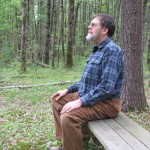(Continued from Part 1 of 2)
So, from the moment I felt the first stirrings of the Spirit of Peace within me, my easygoing relationship to polytheism was under threat.
It would all, from a Pagan point of view, have been so much easier if I had only been called by, say, Pugsley the Peace God. No problems accepting a Quaker Pagan whose god was one among the many! But it is not Pugsley I follow, and that does complicate matters.
There are, after all, Pagan gods whose interests are those of the warrior, and many Pagans have personal codes which more closely resemble Bushido than the peace testimony. One of my favorite Pagan scholars and writers, the courteous and peace loving Brendan Cathbad Myers, has just written a book, The Other Side of Virtue. I’m looking forward to reading it; I have listened to the chapter he read aloud at Deo’s Shadow, and I found it fascinating how he drew the connections he did between heroic cultures, their literature and history, and a possibly system of honor and ethics for modern Pagans.
I also found it chilling and depressing, and frequently had to shut off the audio and set it aside to recover my equilibrium, because, lovely and well-worked as it is, Myers’ ethics are those of a warrior culture.
I don’t care a lick for Christian teachings of heaven or hell. I have no use for salvation, I cannot see nature as “fallen” (though I’m not too wild about influenza, old age, and death, to be honest) and I’ve got no understanding of “sin,” whatever that is.
But I know that there is that within me that can no longer bear to settle for the ethics of the warrior, however honorable. And I think that holding up and glorifying these myths is a mistake, and a dangerous mistake at that. I don’t know what to do with that painful sense of wrongness about this lovely book by a writer I admire. I suspect that I’d better listen very, very closely to the Light, and not go haring off on a crusade, outrunning my leadings in response to my personal sense of pain.
But I am clear that my relationship with the Light, and with the peace testimony that has come out of that relationship, has already set me in opposition to at least one important cultural and ethical current in the Pagan world.
This is highly inconvenient. I would really hate to begin to define myself as not-Pagan, after all these years.
Well, why?
Because all of my oldest friends are Pagan. Because I identify so strongly with my Paganism. And because so much of how I see the world, from the form of a hillside against the sky to the history of our species, has been shaped by my Pagan sensibilities. I feel part of something larger than myself, larger than the group of Pagan friends and family I see from day to day… something that feels meaningful and important to me.
Pagans are my people. If I could no longer call myself Pagan, I would feel homeless inside myself.
But is that enough of a reason to consider myself a Pagan? We’ve all known those who like hanging out with Pagans–like the drumming, maybe, or are in love with a Pagan–but aren’t Pagans themselves. “Symps,” I remember calling them, for Pagan Sympathizers. At one time in my life it seemed like I knew a great many such people–folks who didn’t know a horned god from a Hershey bar, but who floated around the edges of any community event. New Agers who showed up at Pagan events to market a book, or to give Tibetan flower essence massages, or what-have-you. Paganism Lite.
By saying that one of the primary things that makes me consider myself a Pagan is the draw I feel to my Pagan people, am I saying that I’m a Symp, or that mine is now Paganism Lite?
No. Not only is my knowledge base deeper than the New Age dabblers who sometimes float along within the Pagan community, but so is my commitment to my people as a people.
Peter and I once spent a fair amount of time discussing what the difference was between the New Age movement and Paganism. I think it was Oberon Zell who once said, “a decimal point,” meaning that an event or a service that would cost $50 from the Pagans would sell for $500 from the New Agers… and that’s part of it. But it’s the reason for the decimal point that’s telling. The New Age movement is about marketing spiritual experiences; the Pagan movement is about being a people who have spiritual experiences with one another. There are things that you give away, or sell at cost, because you’re providing them to your community. The emphasis on building up a community, on relating to one another as a people, as a tribe… to me, that’s a defining element of Paganism. Not that our techniques for building and maintaining community couldn’t stand work… but the aim, that we will be a people who belong to one another as we belong to our gods, that is a good and worthy aim.
And I still share it. I am a Pagan because Pagan people are my people. We are not a religion of the book–we are a tribal religion, a word-of-mouth religion, and a religion of shared experience. This is the Pagan community I belong to: many of us, holding hands, sitting together at a shared hearth-fire. I’m still Pagan because I still feel and feed that communal hearth.
I’m also still Pagan because of what I know of the nature of that hearth: it rises from the spirit of the landscape and the earth. It’s more than an intellectual appreciation for bio-diversity that motivates me; it’s that hills and trees and rivers are a kind of people to me. The soul of nature is just that–a soul, a spirit, and, at the risk of sounding like a total nutter, I believe it speaks to me. I hear it in an inner voice: deep baritone rumblings of mountains; warm, catlike purrings of contented maple trees; the sudden, breathtaking trumpet of a herd of deer glimpsed at twilight. These things have a mana, a numen to them, that I treasure the way I treasure my husband or my child. And there exists a language with which I can speak to them and hear them reply–the language of European mythology.
It is in the faery stories of the Celtic and Germanic world that I hear what a Native American medicine person might hear in the stories of his people. It’s in the Arthurian mythos, and in Appalachian ghost stories that the spirits of the natural world speak to me, and in the fragments of Greek, Norse, and Finnish mythology that have made their way down to me, through the strata of Victorian romanticizers, and into the layers of Wiccan and Druidic teachings that have drawn from them. My dreams and my subconscious are products of my Western culture and upbringing; I am not culturally fluent in Siberian or Meso-American or Asian mythology and archetype. But I am in European-American, and it is in this language that, for years and years, the holy spirits of this world have reached out to me. This is how I know them.
(Can one know these beings, and love the land and its spirits this deeply, from a Christian or Jewish tradition? I would simply have dismissed the idea once. Now, all I can say for certain is that I do not know them in that way. Hills and rocks do not speak to me in Hebrew or in New Testament Greek, and I do not think they ever will.)
I may not know what, exactly, a “god” is; I have more than a little sympathy for the non-theistic, animistic Paganism of Andras Corben Arthen, for I suspect that my need to filter my encounters with the divine in nature through the medium of gods and god-stories limits me. But however confusing the idea of a “god” might be, the stories of European mythology touch me in places that are deep enough that I can feel the movement of spirit from them. It is a great gift, and I cannot imagine repudiating it.
Every now and then, I look up into the eyes of the universe, to discover that a god I know is looking back, loving and recognizing me as I am loving and recognizing them. It’s a joyful surprise, every time.
I might be a monist, but I’m no monotheist. I might be a Quaker, but I find I cannot be satisfied by a god who lived once, over a short enough span to be fully described in the pages of a single book. God, to me, is too big to fit into the Christian package, and too hard to understand to love without the aid of the myths and stories that, somehow, got woven into my RNA when I was still very, very young.
Certain hills painted our feetColors of growing, colors of birth.Certain springs drank us into them,Watered our children and made them strong.Certain rivers asked us questionsWe answered according to season.Certain seasons taught us the songsWe sang to our little onesBare-painted by the hills at our feet.——–Penny Novack















